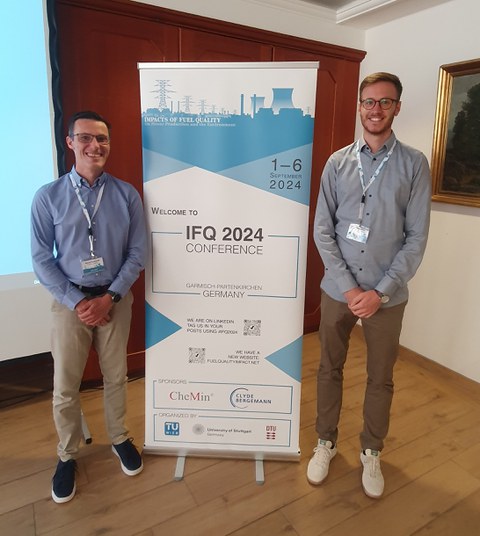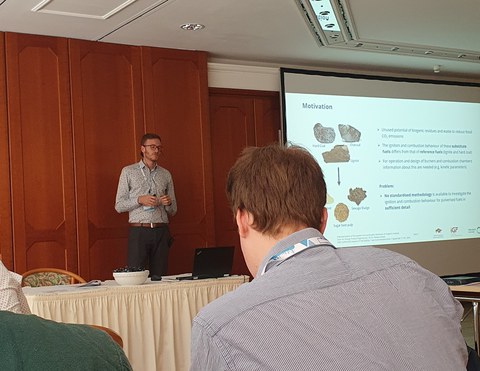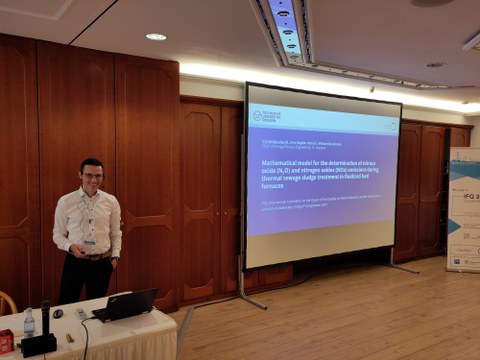Sep 11, 2024
Review: The 29th International Conference on the Impact of Fuel Quality on Power Production and the Environment (IFQ 2024)

Dr.-Ing. Daniel Bernhardt (left) and M.Sc. Matteo Giesen (right) at the IFQ 2024.
From September 2-6, 2024, the 29th International Conference on the Impact of Fuel Quality on Power Production and the Environment (IFQ 2024) took place at the Hotel am Badersee in Garmisch-Partenkirchen, Bavaria. The conference venue at the foot of the Zugspitze welcomed around 75 conference participants from all over the world under the auspices of the Institute of Combustion and Power Plant Technology (IFK) at the University of Stuttgart during this warm week in September. They traveled from Australia, India, Japan, China, Sweden, Denmark, Finland, Poland, the Czech Republic, Belgium and various regions of Germany to present their research results and discuss their findings with international experts.
The Impact of Fuel Quality conference has been bringing together leading experts, scientists and industry representatives since 1963 to discuss current developments, challenges and solutions in the field of fuel and power plant technology. The focus is on the effects on the efficiency of power plants, emission reduction and innovative technologies to minimize environmental impact. The conference provides a platform for the exchange of research results and best practices to promote sustainability in energy production and improve compliance with environmental standards.
The Chair of Energy Process Engineering was represented by M.Sc. Matteo Giesen and Dr.-Ing. Daniel Bernhardt. Matteo Giesen presented his research on the first day of the conference. The title of his contribution was: "Characterization of the ignition and combustion behavior of biogenic residues". Biogenic residues and waste materials offer the possibility of reducing fossilCO2 emissions as substitute fuels. However, they have different ignition and combustion behavior compared to conventional fuels such as coal. However, this information is essential for the operation of pulverized fuel furnaces. In the article, the extension of the existing ignition furnace method using NIR and UVVIS spectroscopy was presented and test results from the experimental investigation of wood dust and residues from olive oil production were discussed.

Dipl.-Ing. Matteo Giesen auf der IFQ 2024.
Dr.-Ing. Bernhardt spoke on 6 September on the topic: "Mathematical model for the determination of nitrous oxide (N2O) and nitrogen oxides (NOx) emissions during thermal sewage sludge treatment in fluidized bed furnaces". The subject of the paper was mono sewage sludge incineration in fluidized bed furnaces. The incineration process produces nitrous oxide (N2O), which has a greenhouse gas (GHG) potential around 300 times higher thanCO2. Although N2O concentrationscan be reduced with comparatively simple measures by increasing the combustion chamber temperature, nitrogen oxide (NOx) emissions increase. The article presented a physico-chemical model with which the N2Oand NOx concentrations can be calculated as a function of the fluidized bed-specific process conditions. The calculation program was validated using operating data from one of the largest German mono sewage sludge incineration plants. Simulations of primary measures were carried out for this plant using the calculation model, with which a significant reduction in N2Oand NOx emissions can be achieved through a combination of fuel and air staging.

Dr.-Ing. Daniel Bernhardt während der Präsentation seines Beitrags.
In addition to his own contribution, Dr.-Ing. Daniel Bernhardt also chaired Session 15: Modelling & Beyond II, which took place on September 6.
At the meeting of the conference committee, he was also appointed to the ten-member scientific advisory board of the IFQ, which is a great honor and recognition of his scientific work to date. We congratulate Dr.-Ing. Daniel Bernhardt on this appointment.
In conclusion, the 29th International Conference on the Impact of Fuel Quality on Power Production and the Environment (IFQ 2024) has once again demonstrated the importance of continuous exchange between science and industry in order to effectively meet the challenges of efficient energy supply and environmental protection.
